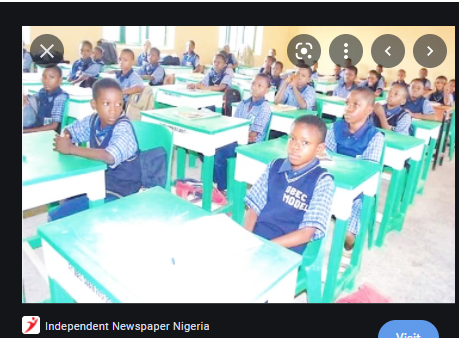Parents struggle with having to send their children to cheaper schools
By Jeph Ajobaju, Chief Copy Editor
Rising costs of the necessities of life – food, clothing, housing, education, water, electricity – coupled with Value Added Tax on nearly all consumer goods to service Nigeria’s debt are making it harder for parents to pay their children’s school fees.
Nigeria’s debt rose to N35.465 trillion in half year ended June 30 (H1 2021), according to the Debt Management Office (DMO), a jump from $87.24 billion in the first quarter of 2021 (Q1 2021) and $86.39 billion (Q4 2020).
This excludes $4 billion and €710 million for which President Muhammadu Buhari requested approval from the National Assembly (NASS) on September 13 to borrow from bilateral and multilateral organisations to fund the 2021 budget deficit.
Poor funding of public schools compels Nigerians to send their children to private schools, some up to university – all of which are expensive. But it is becoming harder to do that with high rate of unemployment, wage stagnation, and rising living costs.
Unless there is a turnaround, that means fewer Nigerian children will be educated in the coming years, even as the country already has one of the lowest literacy rates in the world.
__________________________________________________________________
Related articles:
26 states neglect N29.38b UBEC fund. Enugu, Ogun, Kwara, Katsina included
States receiving large allocations fail to educate children
Nigeria’s debt now N35.46tr. Minus Buhari’s latest gambit for $4b and €710m loans
World Bank says high jobless rate fuels Nigeria’s insecurity
__________________________________________________________________
Only 10 states – among them Lagos, Bayelsa, Yobe, and Zamfara – have provided 50 per cent matching grants to collect their allocation from the N29.38 billion with the Universal Basic Education Commission (UBEC), according to its latest data.
UBEC is in charge of the money voted by the federal government to fund free primary and junior secondary school (JSS) across Nigeria, a country with about 40 per cent (80 million) of its 200 million population illiterate.
Literacy rate is the percentage of population aged 15 years and over who can both read and write with understanding a short simple statement in his/her everyday life, as defined by the World Health Organisation (WHO).
Generally, the WHO adds, ‘literacy’ also encompasses ‘numeracy’, the ability to make simple arithmetic calculations.
No choice
“I had no choice but to plead for three months to secure another apartment and pay the school when it became obvious that getting another job may not happen as soon as I expected.
“If I can’t pay the school fees by the end of November, I will withdraw my kids from school and help them privately prepare for major examinations like Junior WAEC and GCE,” Stanley, a parent in Lagos, told Nairametrics.
The rising cost of tuition and other education-related expenses force parents to delay payments or to downgrade their children to cheaper primary and secondary schools.
Several parents said they could no longer afford their wards’ tuition fees due to the prevailing economic hardship that has reduced their purchasing power, leaving them financially incapacitated.
Some said by their projections, tuition payments are unlikely until at least the end of November, others mulled downgrading their wards to cheaper schools, augmented with home tuition.
A number of severely affected parents disclosed plans to withdraw their children from school for an unforeseeable period of time if their financial situation remains unchanged.
Among the middle and upper class parents surveyed by Nairametrics, a few said they have requested moratoriums from the proprietors of schools.
A moratorium is a legal authorisation to debtors to postpone payment. It can be obtained by parents – it is not popular in Nigeria but it is in India – to prevent a school from taking legal action against them.
Hike in tuition fees
A parent whose children attend a school in the Oregun axis in Lagos said the school informed him of a 15 per cent hike in tuition and school bus fees from the new session which began on September 13.
In July 2020, his employer, a petroleum product marketer in Lekki, gave him the option of accepting a 40 per cent pay cut or resigning. He chose a pay cut.
In July 2021, the company sent an email to about 40 per cent of its workforce, asking them to stay at home pending the time the economy will rebound, and 50 per cent of the remaining staff were asked to work from home with another 25 per cent pay cut.
“I accepted the pay cut because it pays me to take a pay cut than being out of a job. At the point when I got the email, I knew it would be tough to make ends meet, especially paying school fees.
“I had to resort to a ride-hailing side hustle to survive,” narrated the parent, who did not want his name published.
“I could afford to pay the fees for the three of them, but our rent will be due in October. I asked the school to give me till the end of November to pay up so as not to get overwhelmed by the piling expenses.
“As expected, the school said ‘no’, adding that ‘No fees, No resumption.’ I may have to move them to another school closer to the house, which is about 40 per cent cheaper.”
Ade Caleb described her dilemma as being stuck between paying exorbitant fees and changing her kids’ school.
She said the school raised the fees of her three boys by 20 per cent and the cost of other co-curricular activities, textbooks, exercise books and uniforms by 25 per cent each.
She also lamented the increasing cost of school bags, shoes, and other back-to-school materials.
Her words: “The cost of quality education is gradually becoming unbearable for some of us. I understand it is not entirely the fault of the schools too, as the cost of everything has been on the increase for years but the management should consider the fact that our salaries have largely remained the same.
“To cut the expenses, I have suspended the school bus arrangement and made other plans to drop and pick my children. I have also fixed and cleaned their former school bags which we had abandoned.
“I would have changed their school to a cheaper one if the school authority had not agreed to let me differ payment of the tuition till the end of October 2021.
“Also, the total cost of securing a new school, which offers lower quality, is quite close to the fee I am expected to pay to the old school.
“Though I understand the cost will reduce subsequently, if I have not secured a better job by the next session, I will change their school.”
Varying fees
Nairametrics notes that many parents have lost their primary sources of income and for those whose children attend private school, many are considering stepping down to cheaper alternatives as the economic pressure mounts.
Schools are cheaper in some parts of Lagos than others. Here are the average secondary school fees per session:
- Omole – between N500,000 and N600,000
- Anthony Village – between N800,000 and N1.7 million
- Lekki – between N1 million and N4 million
Finding alternatives
Tobi Aboaba, an educationist, said the impact of job losses and salary slashes due to pandemic lockdown last year would be felt harder from this year on as parents lower their standard in the choice of schools.
“Financial hardships caused by the Covid-19 pandemic had hit parents with wards in private schools harder than public schools. I think you will see a decrease in enrolment in private schools in September 2021 and 2022 too,” he explained.
Gbenga Ajayi, another educationist, agreed with Aboaba on the increasing heat expected in the education sector due to job losses of some parents.
He said the solution is for federal and state governments to restore the glory of unity and state schools to create alternatives for parents, whose incomes are limited.
Ajayi counselled that “education fund is a very smart thing to do because it is money set aside for the purpose of investing in your children’s education.
“This is a very wise thing to do because as you may well know, availing a child proper education is one of the best investments any parent can ever make, especially in this part of the world.
“It is best to start building an education fund early because the older your children become, the costlier it will be to educate them. Starting an education fund for the children helps parents pay their school fees without getting overwhelmed.”











